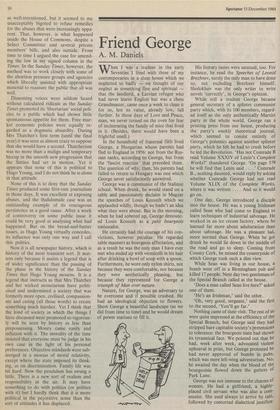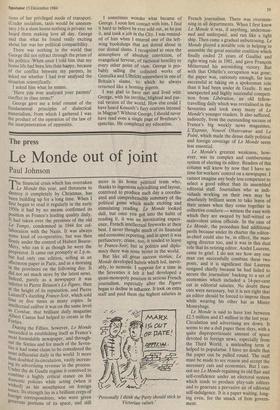Friend George
A. M. Daniels
When I was a student in the early Seventies I lived with three of my contemporaries in a slum house which we neglected so badly — we thought of our neglect as something fine and spiritual — that the landlord, a Latvian refugee who had never learnt English but was a chess Grandmaster, came once a week to clean it for us, lest its value, already low, fall further. In those days of Love and Peace, man, we never turned on the oven for fear of incinerating the family of mice that lived in it. (Besides, there would have been a frightful smell.)
In the household of fraternal filth lived George, a Hungarian whose parents had fled to England in 1956: not from the Rus- sian tanks, according to George, but from the 'fascist reaction' that preceded them. The question of why, then, his parents had failed to return to Hungary was one which George never satisfactorily answered.
George was a communist of the Stalinist school. When drunk, he would stand on a table and passionately declaim in Magyar the speeches of Louis Kossuth which we applauded wildly, though we hadn't an idea what they were about. But in the morning, when he had sobered up, George denounc- ed Louis Kossuth as a petit bourgeois nationalist.
He certainly had the courage of his con- victions, however peculiar. He regarded table manners as bourgeois affectation, and as a result he was the only man I have ever met who ended up with vermicelli in his hair after drinking a bowl of soup with a spoon. Furthermore, he wore only nylon shirts, not because they were comfortable, nor because they were aesthetically pleasing, but because they represented for George a triumph of Man over nature.
Nature, for George, was an adversary to be overcome and if possible crushed. He had an ideological objection to flowers. Show George a beautiful landscape (as we did from time to time) and he would dream of power stations to fill it.
His literary tastes were unusual, too. For instance, he read the Speeches of Leonid Brezhnev, surely the only man to have done so, not excluding Brezhnev himself. Sholokhov was the only writer to write novels 'correctly', in George's opinion.
While still a student George became general secretary of a splinter communist party which, with its 100 members, regard- ed itself as the only authentically Marxist party in the whole world. George ran a printing press from our house, producing the party's weekly theoretical journal, which seemed to consist entirely of George's polemics against another splinter party, which he felt he had to crush before he led the Revolution. 'Has not Comrade B read Volume XXXIV of Lenin's Complete Works?' thundered George. 'On page 379 he will find that Lenin said ....' Comrade B., nothing daunted, would reply by asking whether Comrade George had not read Volume XLIX of the Complete Works, where it was written .... And so it would go on.
One day, George introduced a disciple into the house. He was a young Irishman called Sean who had come to England to learn techniques of industrial sabotage. He worked in an ice cream factory, where he learned far more about adulteration than about sabotage. He was a pleasant lad, more normal than George. When he got drunk he would lie down in the middle of the road and go to sleep. Coming from County Cork, he missed the countryside of which George took such a dim view.
While Sean was living in our house, a bomb went off in a Birmingham pub and killed 17 people. Next day two gentlemen of the Special Branch called at the house.
'Does a man called Sean live here?' asked one of them.
'He's an Irishman,' said the other.
'Oh, very good, sergeant,' said the first to the second, 'You'll go far.'
Nothing came of their visit. The rest of US were quite impressed at the efficiency of the Special Branch, but George said they had stripped bare capitalist society's pretensions to tolerance: the bourgeois state had shovvn its tyrannical face. We pointed out that he had, week after week, advocated violent upheaval in print, but George protested he had never approved of bombs in pubs, which was mere left-wing adventurism. No, he awaited the day when the blood of the bourgeoisie flowed down the gutters of Park Lane.
George was not immune to the charms of women. He had a girlfriend, a highly placed civil servant who was also a coin' munist. She used always to arrive by taxi, followed by contorted dialectical justifica- tions of her privileged mode of transport. (Under socialism, taxis would be unneces- sary.) In a slum house nothing is private: we heard them making love all day. George said that what he found really exciting about her was her political compatibility.
There was nothing in the world that George did not refract through the prism of his politics. When once I told him that my home life had been less than happy, because of the conflict between my parents, he asked me whether I had ever analysed the Situation scientifically.
I asked him what he meant.
'Have you ever analysed your parents' conflict in class terms?'
George gave me a brief resume of the fundamental principles of dialectical materialism, from which I gathered I was the product of the operation of the law of the interpenetration of opposites.
I sometimes wonder what became of George. I soon lost contact with him. I find it hard to believe he ever sold out, as he put it, and took a job in the City. I was remind- ed of him when I entered one of the left- wing bookshops that are dotted about in our dismal slums. I recognised at once the atmosphere of absolute conviction, of evangelical fervour, of factional hostility to every other point of view. George is pro- bably selling the collected works of Gomulka and Ulbricht somewhere in one of Britain's slums, to which he always returned like a homing pigeon.
I was glad to have met and lived with George, with his terrible, blighted and par- tial version of the world. How else could I have heard Kossuth's fiery orations intoned in Magyar? Without George, I should never have read even a single page of Brezhnev's speeches. He completed my education.



















































 Previous page
Previous page